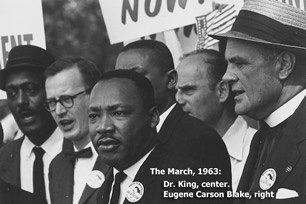Looking back on two landmark events in the pursuit of racial justice in the United States, the National Council of Churches’ (NCC) governing board has called on its “member communions and partners, persons of faith, and persons of good will ... to renew our personal and institutional commitments to racial justice and harmony.”
In a resolution commemorating the 150th anniversary of the Emancipation Proclamation and the 50th anniversary of the civil rights march on Washington, the NCC pointed out that churches and religious groups have been advocating racial and human justice since long before the United States won its independence.
“We join in prayer to our loving God to lead us to live with one another as Jesus taught us: not as strangers who shrink from one another in fear, but as neighbors who reach out to one another with empathy and compassion,” the governing board said in the resolution entitled “Pursuing the Dream.”
The resolution traced church commitments to racial equality throughout the long history of the United States.
“Abraham Lincoln was still a country lawyer in Illinois when U.S. churches formed abolition societies,” the resolution declares. “The immediate emancipation of slaves in the United States was always an urgent moral issue for U.S. Christians. Indeed, church abolitionist movements predate the birth of Lincoln and the United States itself.”
But the dream of racial justice has not been fully realized in the United States, even after the election of an African American president, the resolution acknowledged. The NCC statement cited the vast national divisions following the Florida murder of unarmed black teenager Trayvon Martin and the acquittal of the accused shooter, George Zimmerman.
The resolution also quoted NCC President Kathryn Lohre: “We are reminded that racism is alive and well. We have seen this in the Supreme Court’s recent invalidation of parts of the Voting Rights Act and now in the shocking impunity granted by a Florida jury to a man who stalked and killed a black child.”
The resolution called on churches to “repent of our failings to live with one another as God commanded, that is, with unconditional love for God and our neighbors, whoever they may be.”

